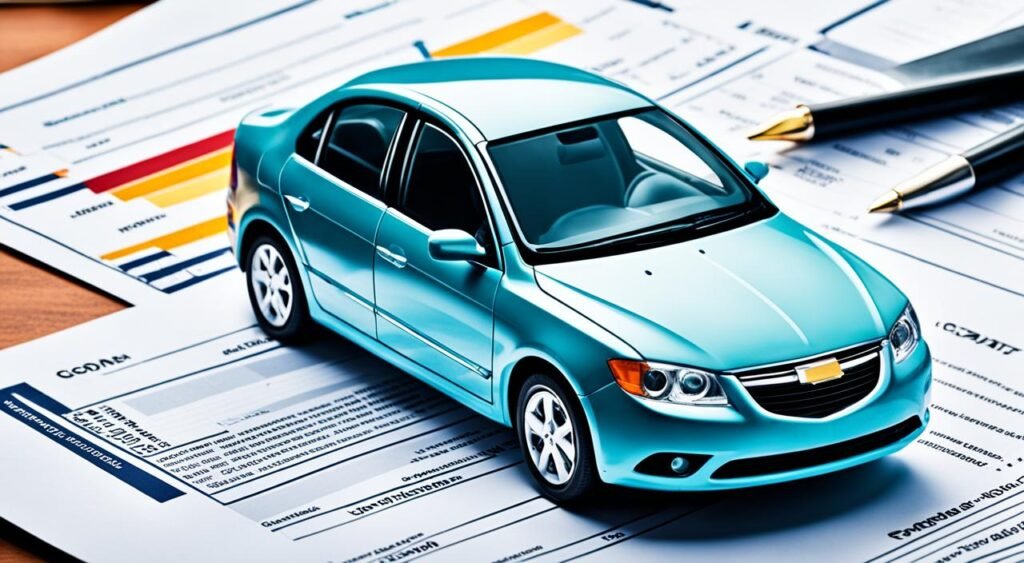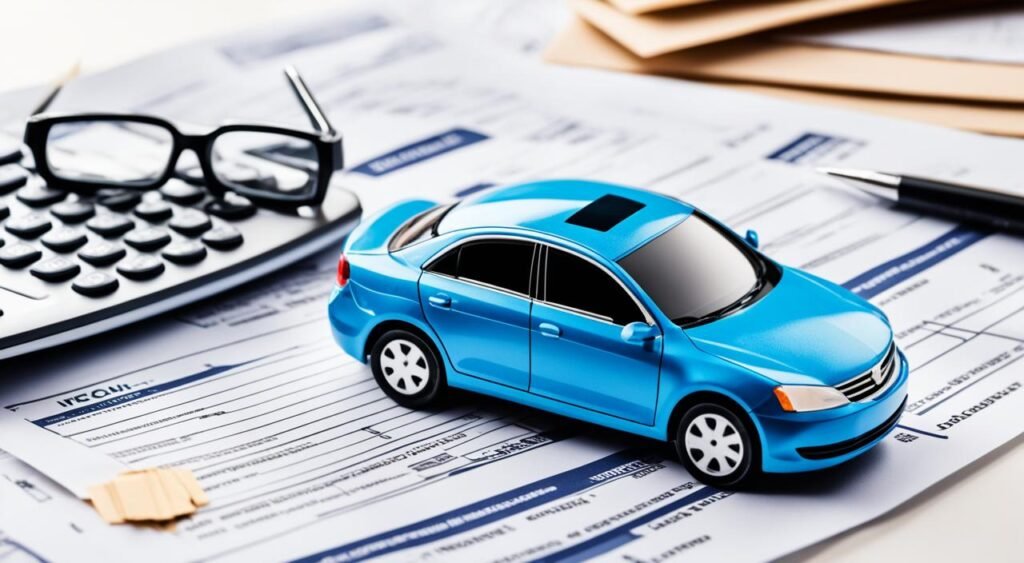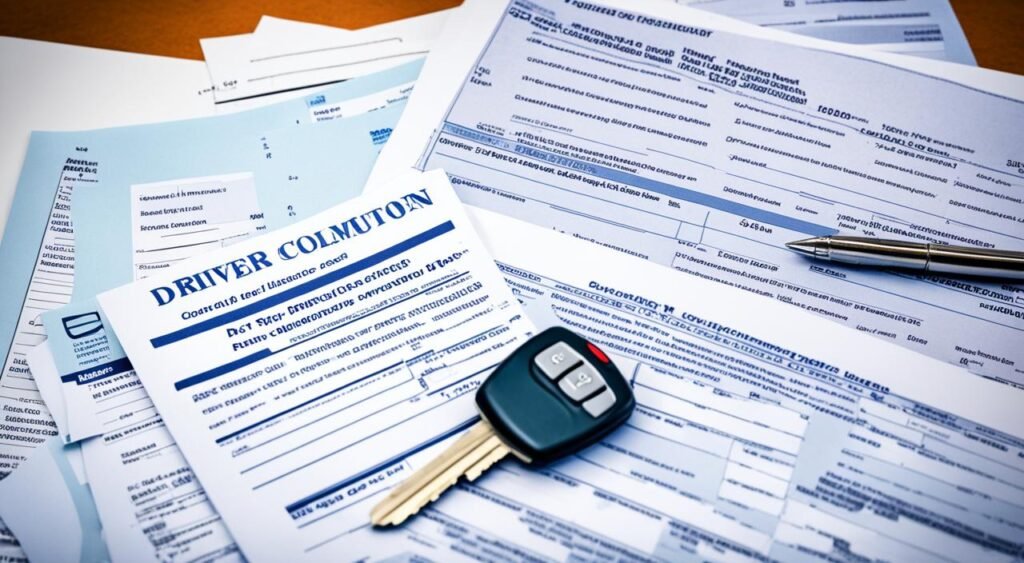When you apply for a car loan, the lender needs to check your details. They want to see who you are, how much money you make, your credit history, and the vehicle you’re buying. Having all these documents ready can make your loan process smoother. It can also help you get better loan terms.
To get a loan, you need to prove who you are, show where you work, and give information about the car you want to buy. You should have your ID, pay stubs or other proof of earnings, a copy of your house bill, credit report, and the car’s details ready. Don’t forget about the insurance papers.
For your income, you can use pay stubs, W-2 forms, or tax returns. If you have any other income sources, like from rent or investments, keep those records too. Your financial history details like credit scores, loans, and any debt records are crucial.
Car details should be ready too. This includes the VIN number, the car’s price, and how much you’re paying down. You also need the insurance coverage papers.
Key Takeaways
- Lenders require various documents to verify the applicant’s identity, income, credit history, and vehicle details for a car loan application.
- Proof of identity, income, and residence are essential, along with credit and financial history information.
- Detailed vehicle information, including the VIN, purchase price, and down payment, is also required.
- Proof of auto insurance in the form of a declarations page is necessary before finalizing the car loan.
- Gathering all the required documents ahead of time can help streamline the application process and increase the chances of getting approved.
Introduction
When you want to get a car loan, you’ll need to show a few important papers. These include things to prove who you are, how much you earn, and your past money borrowing. Plus, you need to show details about the car you want to buy. Getting all these papers ready early can make the loan process go smoother. It also makes it more likely you’ll get a good deal on your loan best auto loan rates used car loan new car purchase new car purchase navy federal credit union.
To get a car loan, you must give a bunch of info and papers to the bank or lender. This info shows them if you’re likely to pay back the loan and if the car is a good deal. By having all these documents ready, you can make things easier for yourself. This means you have a better chance of getting a loan with good terms competitive rates competitive rates car buyer car buyer auto refinance used vehicle new and used car best rate.
Next, we’ll dive into the important documents lenders ask for when you apply for a car loan. We’ll give you tips on how to collect and sort these papers. This will help ensure your loan application goes well excellent credit life of the loan find the best minimum loan amount excellent borrower credit history first-time car buyer auto lender.
Proof of Identity and Residence
Federal laws ask lenders to check who is borrowing money to stop terrorism and money scams. People wanting a loan must show their face and name on a driver’s license, passport, or other ID.
Driver’s License or Government-Issued ID
A driver’s license or a government photo ID like a passport is often needed. These show lenders you are really the person you say you are. This helps follow rules about stopping illegal money moves refinance your auto loan rates subject to change car loan rates existing auto loan monthly car loan payment auto refinance loans.
Utility Bills or Bank Statements as Proof of Address
Lenders also want to know where you live. You can show this using a bill like for electricity or gas. A bank statement works too. These papers must have your name and address on them.
Proof of Income
When you apply for a car loan, the lender needs to know how you make money. They ask for things like pay stubs, W-2 forms, or tax returns. This helps them figure out if you can pay back the loan want to refinance your auto.
Pay Stubs or W-2 Forms
If you have a job, the lender will want to see your recent pay stubs or W-2 forms. These show how much you make and that you are employed. Lenders use this information to decide how much money they can loan you.
Tax Returns for Self-Employed Individuals
If you work for yourself, you must show your tax returns. Lenders look at these to understand your income and expenses. This information helps them check if you can afford the loan able to buy a car advertised rates new or used car loan price of the car get an auto loan negotiate the best auto loan calculator to determine.
Additional Sources of Income Documentation
It’s also good to show other ways you earn money, like rent from properties, investment earnings, or alimony. This extra information helps lenders see your full financial situation. It can make your application stronger.
Credit and Financial History

Lenders check an applicant’s credit and financial history closely. They use this info to gauge creditworthiness and set fair loan terms. This review looks at several parts of the applicant’s finances minus any down payment minus any down payment credit requirements minimum credit score requirement rates may auto financing rates.
Social Security Number
The applicant must give their Social Security number. Lenders use it to check their credit report and score. With this, they can confirm the applicant’s identity and check their credit history in detail.
Credit Reports and Scores
Lenders check the applicant’s credit reports from Experian, Equifax, and TransUnion. They look at payment records, credit use, and any late or missed payments. The credit score shows how likely the applicant is to pay back a loan. It’s crucial for deciding the loan’s terms, like interest rate and amount length of the loan length of the loan length of the loan.
Debt-to-Income Ratio
Lenders also look at the debt-to-income ratio. It compares the applicant’s debt payments with their income each month. This gives lenders an idea of how well the person can handle their car loan along with other debts loan is offered.
Bankruptcy or Collection Records
If the applicant has faced bankruptcy or had collections, these will be important. It can lower their credit score and affect the loan terms. They might face higher interest rates or less ideal loan conditions.
Vehicle Information

Applying for a car loan means giving crucial vehicle details. Lenders use this to check the car’s value and ensure loan terms match the car’s features.
Vehicle Identification Number (VIN)
The Vehicle Identification Number (VIN) is like a car’s fingerprint. It’s a special 17-digit code. Lenders need the VIN to confirm the car’s make, model, year, and more.
Purchase Price and Down Payment Details
Lenders also want to know the vehicle’s price and any down payment. This helps them set the loan amount, interest rate, and monthly payments. They do this based on how much you can afford.
Bill of Sale or Purchase Agreement
In buying from a private seller, the lender might ask for a bill of sale. This includes the price, car details, and the buyers’ and sellers’ names. It shows key details about the sale.
Car Loan
Applying for a car loan means gathering several important documents. You’ll need to show who you are, your income sources, your credit history, and the vehicle details. Collecting these items early on can make the application process smoother. This preparation also improves your odds of getting good loan terms.
Lenders ask for specific information when you apply for a car loan:
- Proof of Identity: You need a driver’s license or another ID to confirm who you are.
- Proof of Income: Provide your pay stubs, tax documents, or W-2s. This shows you can pay back the loan.
- Credit and Financial History: They’ll need your Social Security number, credit score, and any past money troubles. This includes bankruptcies or collections.
- Vehicle Information: Give them the car’s VIN, its purchase price, how much you put down, and your purchase paperwork.
- Proof of Insurance: You’ll have to show an insurance document. It should list what it covers and your deductible.
Having all the necessary papers ready can speed up your loan application. This could help you get a loan with very good terms.
Proof of Insurance
Lenders need to see proof of auto insurance before they finalize your car loan. This is to make sure they’re protected if something happens to the car. You have to show them the declarations page from your insurance. It has the policyholder’s name, the insurance company’s name, the NAIC number, and the policy number.
Declarations Page from Insurance Provider
The declarations page proves you have the right car insurance. It shows the important details of your policy, like what’s covered, your deductibles, and any extra features you might have added.
Coverage and Deductible Requirements
There are specific things your auto insurance policy must include. Lenders usually ask for collision and comprehensive coverage. They also say the deductible can’t be more than $500. This makes sure your car is well protected if something happens to it.
Trade-In Documentation
When you want to get a car loan, it helps to have all the right documents if you’re trading in a car. The main things you need are the car’s title and its registration papers.
Vehicle Title
The car’s title shows who owns the car you’re selling. It includes any loans or debts tied to the car. You’ll have to show this to the loan provider.
Vehicle Registration
Also, make sure to bring the latest registration info for the car. This proves details about the car, like its brand, type, year, and its VIN number.
Payoff Information for Existing Loans
If you’re still paying off the car you’re trading, get details on how much you owe. This allows the dealership to settle that loan.
Having all these documents makes buying a car easier. It makes sure everything goes smoothly for you.
Additional Tips and Considerations

While applying for a car loan, remember some important tips. These will help make your process smooth and successful.
Accuracy and Completeness of Application
It’s key to fill in the car loan application correctly and fully. Mistakes or missing details may slow down or stop your approval. Check everything, from your info to the car you’re getting, twice.
Avoiding Outside Funding for Down Payment
Lenders say not to use funding from outside for your down payment. For example, using money from a home loan or other loans could make them worry. They might think you can’t handle paying back the car loan. It’s much better to use your own money for this. It shows you’re good with money.
Reading and Understanding Loan Agreement
Take time to read and get what the loan agreement says before signing it. This document is very important and has legal power. You need to know what you’re getting into, such as the interest rate, when and how you’ll pay back, and any extra fees. Always ask the lender if you’re unsure about something.
Also Read: What Is A Business Loans And How Can I Get One?
Conclusion
Getting a car loan is a key step in buying a new or used car. Knowing what paperwork to have can make the loan process smooth. You’ll need to show your ID and how much you earn, and tell about the car you want to buy. Having this info ready can help you get a loan with good terms.
Being ready and organized are vital for a good loan application. It means looking over your documents to make sure they’re correct. Also, understanding the loan terms is crucial. This way, you’ll feel prepared and excited to get the car you’ve always wanted.
Lenders check if you’re a safe bet to lend money to. They look at your application closely. To make a strong case, prepare your paperwork carefully. Show them you can handle a car loan that fits your budget and needs.
FAQs
Q: What documents are needed when applying for a car loan?
A: When applying for a car loan, you typically need documents such as proof of income (pay stubs or tax returns), proof of residence (utility bills or lease agreement), proof of insurance, driver’s license, and possibly references.
Q: How is the auto loan rate determined?
A: The auto loan rate is determined based on factors such as your credit score, the term of the loan, the amount borrowed, the type of vehicle being financed, and current market conditions.
Q: What is a refinance loan for a car?
A: A refinance loan for a car is when you take out a new loan to pay off your existing auto loan, often to secure a lower interest rate or better loan terms.
Q: How can I estimate my monthly car payment?
A: You can estimate your monthly car payment by using an auto loan calculator, which takes into account factors such as the loan amount, interest rate, and term of the loan.
Q: What is the importance of a good credit score when applying for an auto loan?
A: A good credit score is important when applying for an auto loan as it can affect the interest rate you are offered. A higher credit score may result in a lower interest rate and potentially lower monthly payments.
Q: Where can I find the best auto loan rates?
A: You can find the best auto loan rates by comparing offers from different lenders such as banks, credit unions, and online lenders. It’s also recommended to shop around and negotiate for the best rate.
Q: Can I refinance my existing auto loan to get a better rate?
A: Yes, you can refinance your existing auto loan to potentially get a better rate, especially if your credit score has improved since you initially took out the loan.
Source Links
- https://www.bankrate.com/loans/auto-loans/auto-loan-documentation-checklist/
- https://www.skylacu.com/learning-guidance/auto-loan-documentation-checklist
- https://www.lendingtree.com/auto/car-loan-documentation-checklist/

